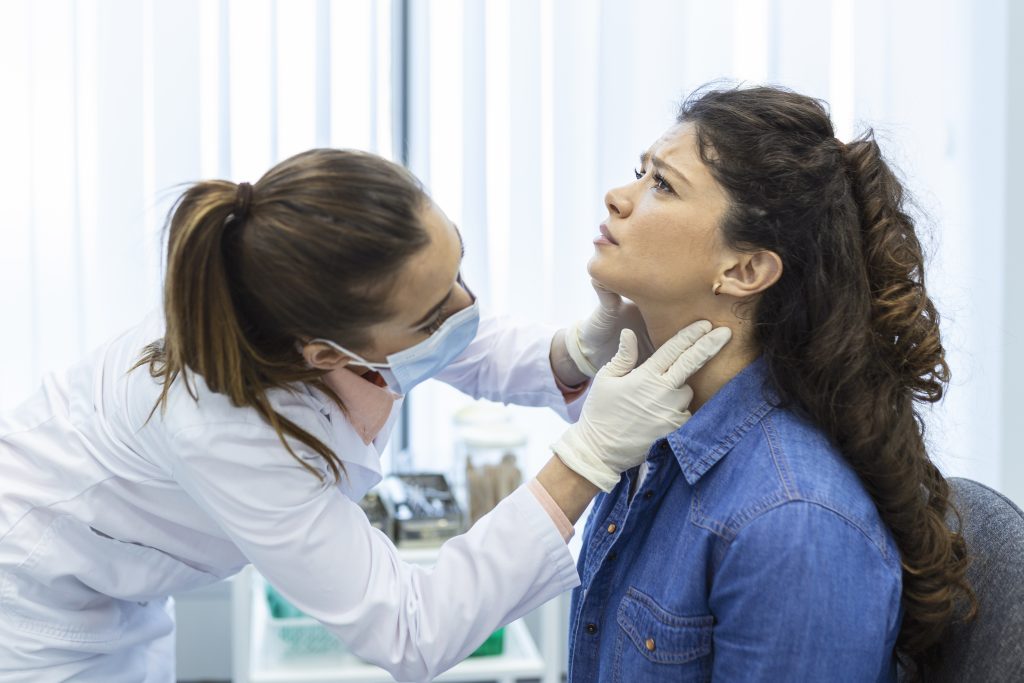Hyperthyroidism is a long-term disorder characterized by an overactive thyroid. But what does that mean? Let’s ensure we have a firm understanding of what the thyroid is and how it functions in the body.
Firstly, let us talk about the Thyroid.
The thyroid gland, also the endocrine gland, is a small organ in the front of the neck that wraps around the windpipe (trachea). It is in the shape of a butterfly with two wide wings extending around the side of the throat.


Homeopathy Treatment For Hyperthyroidism
Triiodothyronine (T3) and Thyroxine (T4) are the hormones secreted by the thyroid gland.
Thyroid Disease:
It is a general medical condition where the thyroid gland is not making the required amount of hormones that control metabolism, body temperature, and heartbeat.
There are two conditions related to the problem are:
- Hyperthyroidism
- Hypothyroidism
What is Hyperthyroidism?
Hyperthyroidism, otherwise known as overactive thyroid, is when the endocrine gland in the neck secrets excessive amounts of the hormone “thyroxine.”
Every organ in the body, including the heartbeat, is impacted by thyroid hormones because they regulate the way body uses energy. Many of your body’s processes speed up with too much thyroid hormone.
Hyperthyroidism Causes:
There are numerous reasons for the causes:
- Graves’ disease is an immune system condition that causes excessive thyroid hormone production. It can impact your heart, skeletal muscles, eyes, skin, bones, and liver, among other bodily parts.
- Thyroid nodules are growth or lumps of cells in the gland which are rarely malignant. These can occur based on genetics or due to iodine deficiency.
- Thyroiditis is swelling of the thyroid gland, which could be painful or painless. The problem occasionally runs in families, with symptoms typically appearing between the ages of 30 and 50.
- Thyroid Eye Disease(TED) is an inflammation of the eye muscles, eyelids, tear glands, and fatty tissues behind the eye. It is an autoimmune disorder where the muscles and fatty tissue around the eyes experience an unusual reaction from the immune system.
- Excess intake of Iodine as it is a crucial component of T4 and T3, and too much Iodine might temporarily elevate thyroid function.
- Elevated T4 levels in the blood-Certain dietary supplementation or excessive thyroid hormone medication might cause high levels of T4.
Signs and Symptoms of Hyperthyroidism:
Initially, the symptoms may be vague and simple to ignore, but if left unattended, an overactive thyroid can push thyroid levels so high that vital organs like the heart and liver enter a state of shock.
The common symptoms of the hyperthyroidism disease include:
- Irregular heartbeat or palpitations.
- Swelling of the thyroid gland, goiter
- Infertility is due to the disruption of ovulation by hyperthyroidism, which reduces fertility.
- Changes in the menstrual cycle as a woman can have a lighter and shorter menstrual cycle.
- Anxiety
- Trouble sleeping as anxiety and increased heartbeats can make the person stay awake.
- Nervousness is when the body starts to work in a faster mode leading to being out of control and jittery.
- Heat intolerance and profuse perspiration
- Weight loss despite increased appetite.
- Being exhausted and having muscle weakness as the thyroid breaks down the muscle tissues.
- Tremors, shaking of hands and fingers constantly.
- Changes in hair texture along with hair loss.
- Diarrhea because the bodily functions speed up, and digestion also happens rapidly.
- Bulging of the eyes can be seen in the Thyroid Eye Disease(TED)
It’s crucial to keep in mind that anyone might develop hyperthyroidism. Most patients may exhibit a fairly typical combination of symptoms, but many may also be experiencing an aggravation of pre-existing diseases, which can initially make the diagnosis difficult.
It may take time for symptoms such as worsening anxiety, insomnia, exhaustion, panic attacks, palpitations, hypertension, or diarrhea to indicate that the thyroid is at fault. To rule out a possible cause of hyperthyroidism, doctors conduct an initial analysis with a blood test.
The most frequent causes of the disease could be goiter, toxic adenoma, or Graves disease. With the help of a thyroid scan, TSH receptor antibody test, and thyroid ultrasound, these can be distinguished from one another.
Foods that are good for Hyperthyroidism
The minerals and nutrients that would affect hyperthyroidism include
- Iodine is essential for the production of thyroid hormones. Following a low-iodine diet can curtail the excessive production of thyroid hormones.
- Calcium and vitamin D are essential because hyperthyroidism can affect bone mineral density.
- Avoid Caffeine-containing foods and beverages as they can make hyperthyroidism symptoms worse.
Low Iodine Foods:
- non-iodized salt
- egg whites
- fresh fruits and vegetables
- unsalted nuts
- bread made without salt and dairy.
- oats
- potatoes
Foods with calcium and vitamin D for better bone health:
- broccoli
- milk (just once per day)
- kale
- fortified cereals
- fish
About Hypothyroidism:
Hypothyroidism which is commonly known as underactive thyroid disease is a common condition. The thyroid gland does not produce enough thyroid hormone if a person suffers from hypothyroidism.
The body’s metabolic functions slow down if enough thyroid hormone is not produced. As a result, the body produces less energy, which slows down metabolism.
Treatment for Hyperthyroidism in Homeopathy
Homeopathy, unlike any other conventional medicine, aids in the production of thyroid hormone naturally by boosting immunity and improving the functioning of the endocrine gland. Homeopathy is focused on using small doses. Millions of patients and homeopaths concur that minimal doses have tremendous health effects.
Dr. Positive Homeopathy has been in the field of Homeopathy for the past 20 years and is striving hard to cure diseases naturally and holistically. 21 Years of Experience in Homeopathy Treatment
Contact Dr. Positive Homepathy to lead a better life if you face any issues concerning hyperthyroidism.
To make an appointment at your nearest Dr. Positive Homeopathy, Call us at +91 7337557851.








